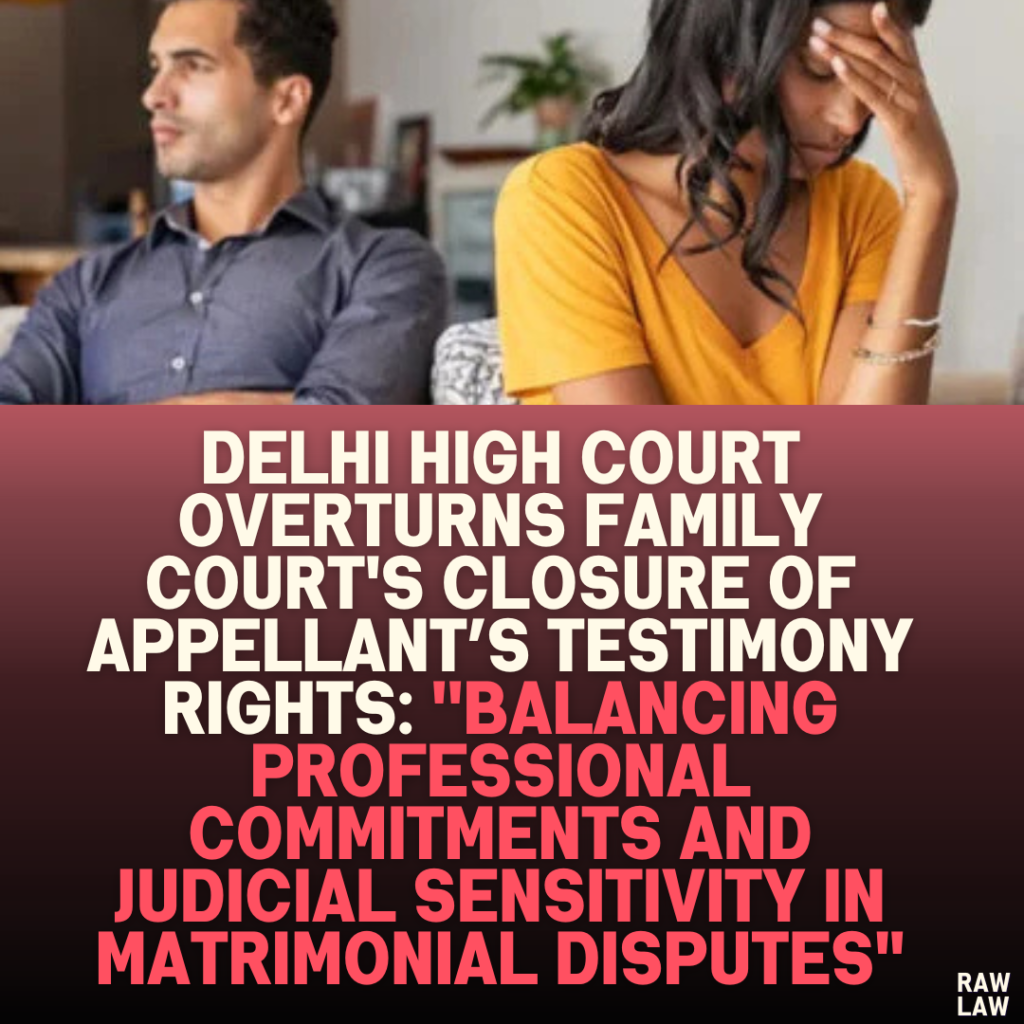Court’s Decision:
The Delhi High Court allowed the appellant’s plea in part, overturning the Family Court’s order that closed the appellant’s right to testify due to her absence during a scheduled cross-examination. The court directed that:
- The final arguments in the case should not proceed until the appellant’s cross-examination is completed.
- The Family Court must fix a date for cross-examination in January 2025, considering the convenience of both parties.
- Family Courts must ensure efficient case management and avoid unnecessary delays in cross-examinations while being sensitive to the litigants’ circumstances.
Facts:
- The appellant and respondent were engaged in a matrimonial dispute under the Hindu Marriage Act (HMA), 1955.
- The appellant had presented herself for cross-examination on two prior occasions:
- The entire day on December 16, 2024.
- From 2:00 PM to 4:00 PM on December 17, 2024.
- On December 17, 2024, she requested a postponement for the scheduled hearing on December 18, citing urgent professional commitments.
- Despite this, the Family Court denied her request and closed her right to testify, arguing that the case had been pending for a long time.
Issues:
- Was the Family Court justified in closing the appellant’s right to testify for non-appearance on a single day?
- Should the appellant’s application for maintenance under Section 24 HMA have been resolved before addressing the main petition?
Petitioner’s Arguments:
- Professional Constraints: The appellant argued that her absence on December 18 was due to unavoidable professional obligations as she worked in a private job to sustain herself.
- Active Participation: She highlighted her previous attendance and diligence during earlier cross-examinations, indicating her commitment to the case.
- Sensitivity: The appellant contended that the Family Court’s approach lacked sensitivity and failed to accommodate her genuine difficulties.
- Section 24 HMA: The appellant submitted that her application for maintenance under Section 24 HMA should have been decided before proceeding with the merits of the case.
Respondent’s Arguments:
- Delay Tactics: The respondent argued that the appellant was intentionally delaying the trial through repeated adjournments.
- Legal Precedent: Citing the judgment in Akash Chadha vs. Preeti Khanna, the respondent contended that the application under Section 24 HMA need not be decided before the resolution of the main petition.
- Fairness: The respondent defended the Family Court’s decision, stating that it was not arbitrary but aimed at ensuring the expeditious conclusion of an old case.
Analysis of the Law:
- Family Courts Act, 1984: The High Court referred to the Act’s preamble, emphasizing its objective to secure speedy settlements in matrimonial disputes.
- Procedural Fairness vs. Expediency: While the Family Courts are mandated to ensure efficient dispute resolution, procedural fairness cannot be overlooked, particularly in sensitive family matters.
- Section 24 HMA: The High Court agreed with the respondent’s reliance on Akash Chadha vs. Preeti Khanna and held that the application under Section 24 HMA could be taken up alongside the main petition, aligning with settled legal principles.
Precedent Analysis:
- Akash Chadha vs. Preeti Khanna: This Delhi High Court ruling established that applications under Section 24 HMA for maintenance need not precede the resolution of the main matrimonial petition. The High Court reiterated this principle, rejecting the appellant’s plea for prioritizing the Section 24 application.
Court’s Reasoning:
- Arbitrary Action by Family Court:
- The High Court criticized the Family Court for hastily closing the appellant’s right to testify without adequately considering her professional commitments.
- It highlighted that the appellant had demonstrated consistent participation, and her inability to attend on a single day did not justify such a drastic action.
- Sensitivity in Matrimonial Cases:
- The High Court underscored the need for sensitivity in family disputes, noting that litigants often juggle professional obligations and personal challenges.
- It observed that family matters require greater judicial accommodation to ensure fairness and justice.
- Expediency in Cross-Examinations:
- The court expressed concern over prolonged cross-examinations in matrimonial cases, which delay resolution and cause undue strain on parties.
- It directed Family Courts to limit cross-examinations to relevant matters and avoid unnecessary delays.
- Judicial Conduct in Family Matters:
- The High Court emphasized the importance of balancing efficiency with fairness, stating that undue haste in family matters could undermine justice.
Conclusion:
The High Court allowed the appeal partly by:
- Setting aside the Family Court’s order closing the appellant’s right to testify.
- Directing the Family Court to complete the appellant’s cross-examination before proceeding to final arguments.
- Urging Family Courts to ensure expeditious yet fair handling of matrimonial disputes, avoiding unnecessary harassment or embarrassment to the parties.
Implications:
- Guidance for Family Courts:
- This judgment serves as a directive for Family Courts to manage matrimonial disputes with sensitivity and fairness.
- It reinforces the importance of expeditious proceedings without compromising litigants’ rights.
- Judicial Sensitivity:
- The judgment highlights the judiciary’s role in accommodating genuine professional and personal constraints of litigants in family matters.
- Efficient Case Management:
- The ruling underscores the need for efficient cross-examinations to prevent undue delays while ensuring that justice is not compromised.




Pingback: Bombay High Court Directs Creation of Supernumerary Seat for MBBS Admission: "Denial Based on Technicality Violates Justice, Merit Cannot Be Compromised by Procedural Formalities" - Raw Law
Pingback: Delhi High Court Rules Courts Must Investigate Forgery Allegations Even If Bail Application Is Withdrawn: "Courts Cannot Shut Their Eyes to Alleged Forged Documents Submitted Before Them" - Raw Law
Pingback: Allahabad High Court Upholds Withholding of Gratuity Pending Disciplinary Proceedings: “Entitlement to Full Pension and Gratuity Is Subject to Proceedings' Outcome” - Raw Law